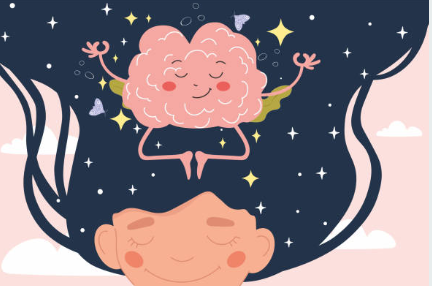What is Mindfulness in Simple Terms
Read on to learn more about Mindfulness in layman’s term and learn how they can benefit your life.

Selfpause Affirmation App
Download the app to get 1,000’s of affirmation meditations and everything you need to write, record and listen to your own.
Mindfulness is the practice of being fully aware of the moment. This means that you pay attention to the things happening around you rather than dwelling on what you don’t like. The practice helps you control your own thoughts and feelings and is also an excellent way to improve your self-regulation and meditation skills.
Self-regulation

Self-regulation is a form of mindfulness that helps people manage their emotions and actions. This practice is crucial for learning, performing, and living a balanced life. It improves resilience and allows people to face difficult situations. By practicing self-regulation, we can control our feelings, calm our racing heart, and stay focused.
Self-regulation is a skill that can be taught to children. A parent can model it by helping a child name their feelings and offering choices for self-regulation. They can also talk about their feelings with a child and encourage them to journal. Self-regulation skills can help children develop lifelong skills that they can use for the rest of their lives.
It has been proven that mindfulness training can improve self-regulation and help people manage their emotions. It also promotes self-compassion. Researchers have studied the benefits of mindfulness-based yoga on preschool children. They found that the children who practiced mindfulness were more likely to pay attention, delay gratification, and inhibit their urges to engage in harmful behavior.
Although there are limited research studies, teachers and parents report positive feedback on mindfulness programs. There are also many mindfulness-based programs available in early childhood settings around the world. The goal of these programs is to bring mindfulness into the classroom and home setting. In addition to benefiting young children, these programs also help create a socially-healthy environment.
Research has shown that the ability to control one’s emotions and actions is a key skill in life. As such, children should be taught to self-regulate at an early age. Developing this skill during early childhood will have long-lasting benefits for their future lives. It is also essential for children to develop self-respect.
Self-regulation is essential to maintaining good mental and emotional health. The tools learned during these early years can help build protective factors against academic, social, and behavioral difficulties in adulthood. Moreover, mindfulness practices can help young children improve their self-awareness and cognitive self-regulation, which are key building blocks for self-regulation.
Present moment awareness

Present moment awareness is a practice of paying attention to the present moment without judgment or distraction. You practice it in any situation, be it at work, home, or on the street. Its goal is to help you slow down, turn off the fight or flight response, and engage the parasympathetic nervous system.
The first step is to close your eyes and take a deep breath. Then, look around you. Notice patterns on the floor, light, windows, and ceiling. As you do this, you’ll become aware of how your body feels and what it sees. Once you’ve done this, you’ll be able to live in the moment.
Another step toward practicing mindfulness is naming your thoughts. Using the words “I” and “me” help us distinguish between what we’re thinking and what we’re experiencing. Then, we can let them pass without being distracted by them. This process may be difficult at first, but it can be accomplished.
By practicing this technique, you’ll be able to better manage stress, anxiety, and other conditions. It can also be used to calm nerves in the wake of a stressful event. Several world religions have praised the benefits of living in the present. Practicing mindfulness can also help students with ADHD and learning disabilities.
Mindfulness practice also includes bringing awareness to your everyday activities. For example, when you wake up, connect to your breath and notice the sounds and sights of your environment. Similarly, when you’re brushing your teeth, focus on the texture of the toothpaste and the feel of the toothbrush on your teeth. Focusing on your body’s sensations while you chew your food can help you recognize when you’re full.
Mindfulness is the ability to observe, accept, and value the present moment. It involves paying attention without judgment and without the desire to rush to make judgments or react to unpleasant situations. By practicing mindfulness, you’ll be able to experience any situation without feeling guilty about it. This skill will help you build trust and rapport with others.
The benefits of mindfulness are plentiful. Research has proven that it reduces stress and improves concentration and happiness. In addition to improving sleep, it can improve overall health and well-being.
Meditation

The basic process of mindfulness meditation involves sitting quietly and focusing on the breath. In addition to focusing on the breathing, some practitioners use a mantra to help guide them. They also focus on their bodies, noticing their sensations from head to toe. Then, they name these sensations, including emotions.
While the practice of mindfulness may not be new to Western culture, it is becoming increasingly popular in the West. Westerners are beginning to adopt concepts of Eastern philosophy, including mindfulness, as an effective way to improve their mental health and well-being. Mindfulness has several practical applications and is quickly becoming an everyday word in colloquial English.
Practicing mindfulness is about knowing your own mind and how to observe it. The mind is good at problem-solving, but not so good at being present. It is filled with thoughts and narratives. These thoughts and narratives often do not reflect reality, and so mindfulness can provide a welcome respite from a busy mind. But this can only be achieved with conscious intention and regular practice.
The most important aspect of mindfulness is living in the present moment. However, this does not mean that you must stay in the present all the time. Humans are naturally distracted by thoughts, and this is normal. Therefore, mindfulness should be understood as the practice of returning to the present moment whenever you are distracted.
Practicing mindfulness is a great way to start the day and release tension. Even a few minutes of practice a day can have significant benefits. Practiced regularly, it can also be a powerful adjunctive therapy to other treatments for anxiety. If you’re new to mindfulness meditation, start with a short meditation class.
The benefits of mindfulness extend far beyond mental health. Researchers have shown that meditation can reduce stress levels. It can make you more aware of your surroundings and help you appreciate the little things.
Benefits

Mindfulness is a powerful tool to help us cope with stress and improve our emotional regulation. It can also improve our cognitive abilities and strengthen our relationships. The practice may also lead to changes in brain structure and function. However, before attempting mindfulness, you should consult with a doctor or therapist to ensure that it is right for you.
Heart disease is a leading cause of death in the United States, accounting for one out of every four deaths every year. Studies show that mindfulness can reduce the symptoms and risks of heart disease. Its calming effects may even lower blood pressure. In addition, mindfulness may help the immune system, which is the body’s primary defense against pathogens and diseases. This is a significant benefit, especially since mindfulness practice may lead to increased T-cell activity.
Mindfulness training has been found to improve the quality of life and the performance of health care professionals. One study of 19 hospital workers found that mindfulness training improved their work engagement and performance. It also increased their comfort level with silence. The study concluded that mindfulness training increases happiness and decreases stress. In addition, it enhances a person’s ability to communicate with others.
Mindfulness increases our well-being by strengthening our ability to focus our attention on the present moment. This increases our ability to savor life as it happens, which makes it easier to engage in activities. It also increases our capacity to cope with life’s challenges. People who practice mindfulness are less likely to worry about the future or their self-esteem. Further, they are more likely to form deep connections with others.
The benefits of mindfulness training extend to individuals who suffer from chronic illnesses. It has been shown to help manage chronic pain, reduce stress, and improve vigor and fatigue in patients. Many studies show that mindfulness training improves both physical and psychological symptoms of cancer. It has also been shown to help caregivers deal with stress, depression, and anxiety.
One study on mindfulness and alcoholism found that people who practiced mindfulness had lower rates of problematic drinking. Another study found that people who practiced mindfulness exercised a higher level of self-control.
Our Top FAQ's
Mindfulness is the practice of being present and fully engaged in the present moment, without judgment. It involves paying attention to one’s thoughts and feelings in a non-reactive way, and being aware of the sensations in the body and the environment.
Mindfulness is often associated with relaxation and meditation, but it is not the same as either of these practices. Relaxation involves letting go of tension and stress, while meditation often involves focusing on a specific object or concept. Mindfulness, on the other hand, involves paying attention to one’s present experience without trying to change it or control it.
Some simple mindfulness exercises that can be practiced daily include:
- Taking a few deep breaths and paying attention to the sensation of the breath as it enters and exits the body
- Focusing on the sensations of the body as it moves through a simple task, such as walking or eating
- Paying attention to the present moment without judgment or evaluation
- Setting aside a few minutes each day to sit in silence and pay attention to the present moment
Mindfulness can benefit individuals in their daily lives in a number of ways, including:
- Reducing stress and anxiety
- Improving focus and concentration
- Enhancing self-awareness and self-regulation
- Promoting emotional well-being and resilience
- Improving physical health
Mindfulness can be incorporated into one’s work or personal relationships in a number of ways, such as:
- Taking a few mindful breaths before beginning a task or meeting
- Setting aside time each day to practice mindfulness meditation
- Paying attention to one’s thoughts and feelings during interactions with others, and responding rather than reacting
- Bringing mindful awareness to daily activities, such as eating or exercising
